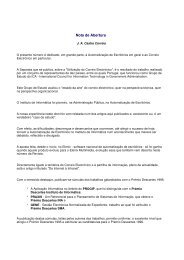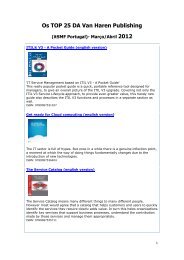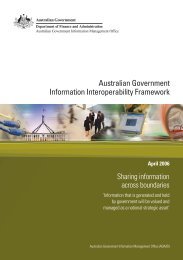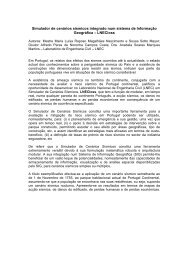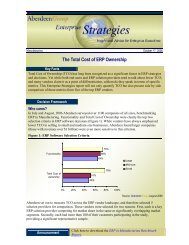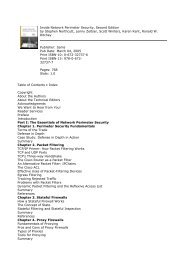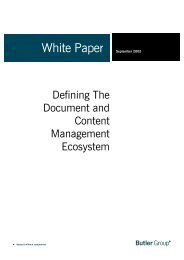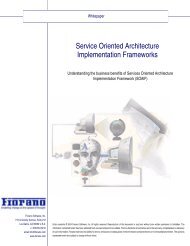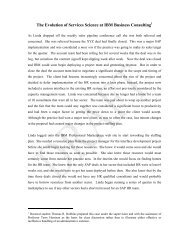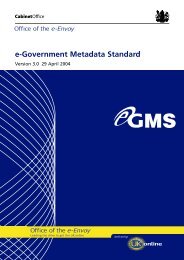OECD Peer Review of E-Government in Denmark - ePractice.eu
OECD Peer Review of E-Government in Denmark - ePractice.eu
OECD Peer Review of E-Government in Denmark - ePractice.eu
Create successful ePaper yourself
Turn your PDF publications into a flip-book with our unique Google optimized e-Paper software.
and the generally high level <strong>of</strong> trust and confidence that Danes have <strong>in</strong> this aspect <strong>of</strong> government<br />
operations – perhaps due <strong>in</strong> part to their long tradition <strong>of</strong> provid<strong>in</strong>g personal <strong>in</strong>formation to a range <strong>of</strong><br />
public registers. The <strong>OECD</strong> survey shows that only 21% <strong>of</strong> respondents consider privacy and security<br />
concerns as be<strong>in</strong>g either a “very important” or “important” potential challenge to e-government<br />
implementation.<br />
Budgetary barriers to e-government<br />
Budgetary environment<br />
Like other Nordic countries, a def<strong>in</strong><strong>in</strong>g characteristic <strong>of</strong> <strong>Denmark</strong>’s budget system is that central<br />
budget def<strong>in</strong>ition and oversight rests with the M<strong>in</strong>istry <strong>of</strong> F<strong>in</strong>ance, while <strong>in</strong>dividual m<strong>in</strong>istries enjoy<br />
decentralised authority for budget execution. The M<strong>in</strong>istry <strong>of</strong> F<strong>in</strong>ance also has responsibility for<br />
budget co-ord<strong>in</strong>ation, collect<strong>in</strong>g budget proposals from m<strong>in</strong>istries and comb<strong>in</strong><strong>in</strong>g them <strong>in</strong>to the f<strong>in</strong>al<br />
government budget proposal.<br />
As a general rule, at the State government level m<strong>in</strong>isters (and therefore m<strong>in</strong>istries) are<br />
responsible for all expenditure decisions taken with<strong>in</strong> their area <strong>of</strong> responsibility, <strong>in</strong>clud<strong>in</strong>g ICT<br />
spend<strong>in</strong>g. Every expenditure decision taken <strong>in</strong> State government is therefore a m<strong>in</strong>ister’s<br />
responsibility. Each m<strong>in</strong>istry is responsible for f<strong>in</strong>al allocation <strong>of</strong> funds with<strong>in</strong> <strong>in</strong> its portfolio <strong>of</strong><br />
responsibilities, with<strong>in</strong> the limits for expenditures for each “spend<strong>in</strong>g m<strong>in</strong>istry” as determ<strong>in</strong>ed by the<br />
M<strong>in</strong>istry <strong>of</strong> F<strong>in</strong>ance.<br />
The M<strong>in</strong>istry <strong>of</strong> F<strong>in</strong>ance exercises an important oversight function over m<strong>in</strong>istries’ expenditure<br />
programmes, and has the power to <strong>in</strong>tervene if they do not respect the spend<strong>in</strong>g ceil<strong>in</strong>gs set for them.<br />
Despite these oversight powers, neither the M<strong>in</strong>istry <strong>of</strong> F<strong>in</strong>ance nor <strong>in</strong>dividual m<strong>in</strong>istries appear to be<br />
systematically monitor<strong>in</strong>g ICT expenditures; as a result, there is no government-wide evaluation <strong>of</strong><br />
ICT spend<strong>in</strong>g available for purposes such as e-government policy or strategy development,<br />
benchmark<strong>in</strong>g or performance assessment.<br />
Types <strong>of</strong> budgetary barriers<br />
In regard to budgetary barriers to e-government, <strong>OECD</strong> survey respondents reported that the most<br />
significant challenge they face is a lack <strong>of</strong> fund<strong>in</strong>g for e-government projects (considered to be<br />
important by 71%), followed by a lack <strong>of</strong> shared/jo<strong>in</strong>t fund<strong>in</strong>g across levels <strong>of</strong> government, and the<br />
difficulty <strong>of</strong> establish<strong>in</strong>g and justify<strong>in</strong>g the costs and benefits <strong>of</strong> e-government projects (both 65%). In<br />
addition, a lack <strong>of</strong> long-term budgetary horizons for multi-year <strong>in</strong>vestments was also seen to be a<br />
significant challenge by nearly half (48%) <strong>of</strong> respondents. Budgetary issues are slightly more<br />
significant for organisations with “small” budgets (less than DKK 100 million) (see Figure 3.1). It<br />
must be noted that, <strong>in</strong> all cases, there is a lack <strong>of</strong> hard data to either corroborate or refute these claims.<br />
This is reflective <strong>of</strong> wider issues related to the capability <strong>Denmark</strong> has to evaluate its e-government<br />
programme and <strong>in</strong>itiatives (discussed above and <strong>in</strong> Chapter 8).<br />
48



